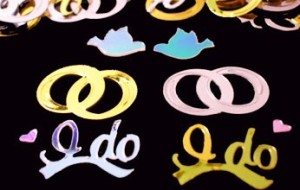What does a Wedding DJ know about Love and Marriage?
Well, after 36 years in the business, I have seen a LOT of weddings. And I daresay I’ve learned a lot from my own marriage of 27 years. I don’t have any special magic to offer, and I certainly won’t pretend I have done everything right! But I very much want to see my wedding clients have successful marriages. So I share these thoughts, with the sincere hope that some engaged couple might benefit from my experience.
“Eros Now, Agape Later!”
Those words were written on the windows of the car at my wedding – by the preacher, who happened to be my father! I may have laughed at the time, but it has come to mean much more to me now.
These are Greek words for two different kinds of love. Eros refers to romantic love, the kind we see in movies, and is the root form of the word “erotic,” which we usually use to mean sexual love. Agape is a pure, selfless love that is freely given, even to the point of self-sacrifice. It is often referred to as Christian love, but is certainly experienced by people of all faith traditions. In fact, it is a doctrinal practice in 8 major religions!
 I knew my Dad was telling me something with his car-window message, and like many things, I would fully understand it later, with maturity. I think it was simply that love grows, love matures, and love takes on a much deeper form as it develops, and as WE develop and mature. Agape is a mature love that is unselfish, and marriages that fail, I believe, have never progressed past Eros to Agape. Selfishness kills marriages.
I knew my Dad was telling me something with his car-window message, and like many things, I would fully understand it later, with maturity. I think it was simply that love grows, love matures, and love takes on a much deeper form as it develops, and as WE develop and mature. Agape is a mature love that is unselfish, and marriages that fail, I believe, have never progressed past Eros to Agape. Selfishness kills marriages.
Those Pesky Old-Fashioned Vows!
Many people choose to write their own wedding vows, or to modify the traditional ones. Sometimes they can be beautiful statements of love and respect. Sometimes they are just different. At a friend’s wedding 20 years ago, I was disturbed by their modified vows. Instead of “As long as we both shall live,” they changed it to “As long as our love shall last.”
I was shocked, and confused about why this was so disturbing to me. After the reception there was a party at their home, and some of our school friends were sitting together when the groom approached us. Oddly, his first question was “How did you like our vows?”
He was shocked that none of us liked “as long as our love shall last” and wondered why he made that specific change. He said “Well, we just don’t believe couples should stay together if they don’t love each other.”
That statement haunted me for many years. To me it sounded like a fair-weather marriage with a bailout clause, and missed the point of getting married. Whither agape?
Learning the Hard Way
It was not until many years later, when I began to face difficult times in my own marriage, that I began to figure things out. You see, I thought we had the “perfect marriage.” Everything was smooth, we didn’t have big fights, and my lovely wife was very patient with me. We had our financial ups and downs, but overall had a pretty good life together, and even enjoyed a few luxuries. But still waters run deep.

“I’ve Been Rich, and I’ve Been Poor – Rich is Better!”
One key to a healthy marriage is to share the financial burdens of the home and family, openly and honestly. I had an expensive hobby – yacht racing – and spent enormous amounts of time and money on it. I loved sailing (see “Mania” in the graphic above), and considered it a big part of my life and part of “who I was.” I was respected in the sailing community, and collected lots of trophies. But over the years, my wife increasingly saw it differently.
Men and Women See Things Differently
My wife viewed the boat as a money-gobbler. She viewed the monthly bill from the Boat Club as a nice car payment. She secretly thought that if we spent the same amount on a ski condo or a beach house all those years, it would be paid for by now. She was patient and tolerant, and I sailed on, oblivious to her growing resentment.
Love is Blind – And It’s Not Enough!
Everyone says “We’re in love” during their engagement. Since long before the ancient Greeks, this thing we call “Love” has been analyzed, scrutinized, sanitized, improvised, and rationalized, and we still don’t understand it.
But we all think we understand it, when it happens to us! And it makes us do crazy things – like get married. And while some are better prepared for it than others, no one can fully anticipate the trials, the challenges, the hazards, the heartache nor the joy that comes from a lasting marriage.
That’s why people cry at weddings!
Poems have been written, and songs have been sung – hundreds and thousands of songs, trust me, I’m a Wedding DJ, and I collect them! And we make promises to love, to honor, and to cherish our partner. The vows themselves admit that love is not enough! It takes more than that to make a marriage last.
Love was correctly identified as a potentially fatal chemical imbalance in the medieval tale of Tristan and Isolde, who accidentally consumed a love potion and turned into hopeless addicts. Even though they realized that her husband, the king, would punish adultery with death, they had to have their love fix.
British chemist Clair McLaughlin gives a scientific explanation of the chemistry of love. She explains that lust comes first – our natural desire to seek a mate, driven by our sex hormones testosterone and estrogen.
Next comes attraction, driven by surging brain chemicals called monoamines: dopamine, norepinephrine and serotonin. Norepinephrine and serotonin excite us, while dopamine makes us feel happy. These “love chemicals” are controlled by a substance which is also found in chocolate and in strawberries, called PEA or phenylethylamine, and it is PEA which controls the transition from lust to love.
Are Cupid’s Arrows Really Drugged?
 My friend and client Reverend Don Scott has performed hundreds of marriage ceremonies, and spent countless hours in premarital counseling. “Young couples enter into marriage blindly, oblivious to each other’s faults,” says Rev. Scott. “They’re twitterpated” he says, borrowing a word from Disney’s classic Bambi. That’s Eros.
My friend and client Reverend Don Scott has performed hundreds of marriage ceremonies, and spent countless hours in premarital counseling. “Young couples enter into marriage blindly, oblivious to each other’s faults,” says Rev. Scott. “They’re twitterpated” he says, borrowing a word from Disney’s classic Bambi. That’s Eros.
But will you love your husband when he’s old, fat and bald, and wears ugly golf pants and reading glasses? Will you love your wife when she’s gray-haired, 40 pounds heavier, and wears dumb fuzzy slippers? Not all of us age as gracefully as the pretty people in the Cialis commercials (whom I suspect are really only 40.) Will you still want to be together, when you have trouble remembering to take your medication? Because THAT is what you vow to do at your wedding!
The Chemical Bond
The third stage of love is attachment – staying together. Attachment takes over from the attraction stage and is the bond which keeps couples together. After all, we couldn’t possibly stay in the attraction stage for ever – we would never get any work done for day dreaming! Two different hormones are important during this phase of love. They are oxytocin and vasopressin.
 Oxytocin (the cuddling chemical) not only increases the bond between lovers, but is also one of the chemicals responsible for contractions during childbirth, milk expression when breastfeeding, and is released by both sexes during orgasm. The theory goes therefore, that the more sex a couple have, the greater the bond between them. Nice touch Mother Nature!
Oxytocin (the cuddling chemical) not only increases the bond between lovers, but is also one of the chemicals responsible for contractions during childbirth, milk expression when breastfeeding, and is released by both sexes during orgasm. The theory goes therefore, that the more sex a couple have, the greater the bond between them. Nice touch Mother Nature!
Vasopressin is the monogamy chemical. Only about three percent of mammals are monogamous; mating and bonding with one partner for life. Unfortunately, humans are not one of these naturally monogamous animals. Endorphins are also involved in the longevity of love. Endorphins have the same pain-killing and pleasure-delivering properties as their cousin, morphine, without the risk of overdose.
SO…Love Is Not Enough, And Chemicals Aren’t Either?
Marriages that survive the trying times are built on mutual respect, patience, and a generosity that often demands self-sacrifice. At various times in a long marriage, you will be required to give more than your share, and sometimes you might even wonder if you really do feel love for this person! As with any close relationship, there will be differences, and emotions run deep in a marriage. Like a small child who screams “I hate you!” when upset with a friend or sibling, you might feel outright hostility toward your spouse at times.
That is when I started to figure it out – to understand why it bothered me so, that my friend changed his vows to say “As long as our love shall last.” The “REAL” vow, in my understanding, was “‘Til death us do part.” And all of a sudden, I finally get it. It’s not about living happily ever after, like the fairy tales tell us. It’s about staying together, through the good and the bad – forever.
We Vow To Stay Together – Even When We Don’t Feel Love!
That’s Agape. It’s loving when you don’t feel loving.
FACT: Men go into marriage hoping she will never change.
FACT: Women enter marriage thinking “I’m gonna change him!”
The reality is that both husband and wife will go through many changes in the course of a lifelong marriage – and this is where you make it or break it.
Changes Strain the Relationship – And Also Strengthen It
All close relationships go through difficulties and disagreements. Think about relationships with parents, brothers and sisters, and roommates. People are different, and people will disagree. But mature adults do not sever a relationship over a disagreement; rather, they come to terms with some form of mutual understanding. And it might be that you agree to disagree!
One unrealistic aspect of young love is feeling a desperate need to be alike. While it’s said that opposites attract, we tend to be attracted to our partners by the things we have in common. Whether we mean to or not, we tend to try to mold each other to share our interests. Young people in love will often “go along to get along,” which makes things easy, at first, but can lead to trouble down the road.
“What do you mean, you hate cats? You said you LOVED Fluffy!”
MORE TO COME…











